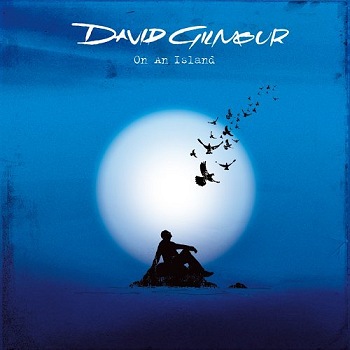|
 |
| David Gilmour - On An Island |
RELEASED MARCH 6th, 2006
An air of chilled contentment
seeps out of the third solo effort from Pink Floyd guitarist, David
Gilmour. Coming some twenty-two years after About Face, it is a
distinctly different proposition. Gone are throwaway tunes like Blue
Light, and in come deeply personal, family-centric meditations.
With the majority of the lyrics
penned with his wife, Polly, On An Island fixes its sights onto what
they believe are the real important aspects of life - love, family,
contentment - things that have no relation to being rich in financial
terms. Indeed, in This Heaven, he notes that "life is much more than
money buys, when I see the faith in my children's eyes..."
The album starts with a
celebration of an evening David spent with friends on a small
Mediterranean island. Two of these friends have died since that
evening, but despite this, the instrumental Castellorizon (named after
the Greek island), and the title track of the album, which follows,
look back fondly ("Remember that night, the warmth and the
laughter...") in celebration, rather than sadness.
Castellorizon starts with what
could be called "future echoes" - elements of later tracks wend their
way into and out of the track, peppered with the sounds of the sea,
birds calling, and gentle orchestration building the mood effectively.
A signature DG solo breaks into the ambience, and sets up expectations
for On An Island.
With soaring guitar work, the
track is evocative and transporting. A slow builder, like most of the
album, it takes a few listens before the various layers and qualities
reveal themselves. As with The Blue, that follows, it features old
Floyd colleague Richard Wright (Hammond Organ on OAI, and vocals on The
Blue), and even older Floyd member, Rado Klose (who left the band a
while before they turned professional) on guitar.
Complete with David Crosby and
Graham Nash on backing vocals, On An Island ebbs and flows like the
tide. This mood continues on the incredibly mellow, almost soporific,
The Blue. Polly's repetative piano refrain propells the track along
nicely, accompanying the swooping and soaring guitar work, and the
delicate vocal.
Take A Breath breaks the mood,
with the only real out-and-out rocker on the album. This will no doubt
prove a disappointment to a chunk of his fans, who thrive on this
aspect of his work.
The song looks at what some call
"hard love" - making a child stand on their own two feet, rather than
rely on a parent's money or position. "If I'm the one to throw you
overboard, at least I showed you how to swim for shore" and "when
you're down is where you'll know yourself" - one wonders if real life
events with his own children inspired the lyrics.
A good, chugging track, with some excellent slide guitar spicing things up.
 |
| David Gilmour - recording session at Astoria |
The
short but sweet instrumental Red Sky At Night follows, and is notable
not least for David's saxophone work. He plays the instrument much like
he would a guitar. In places, there are brooding passages reminiscent
of Shine On You Crazy Diamond... from the sound of the piece, you
expect it to be one of the tracks that Richard Wright guests on.
Amazingly it isn't!
The pace picks up a little with
the jazzy tempo of This Heaven, aided and abetted by Georgie Fame on
the Hammond organ. David has said that this is "a song about being
content with one's lot in life", and lyrically there can be little
mistaking this, with him counting his blessings for what he has.
Another instrumental, Then I
Close My Eyes, includes David playing the cumbus, a Turkish or
Middle-Eastern guitar (depending on which definition you read of its
origins!). A lovely song, which at times brings to mind Fleetwood Mac's
Albatross...but far better, with more depth to it. It is notable, too,
for the glass harmonica work of Alasdair Malloy, and gentle cornet from
Robert Wyatt.
Possibly the oldest song on the
album is up next, and will be familiar to many of you. Smile was
written some ten years ago, and the recording on the album is pretty
much his original demo from 2001, with a little bit of tidying up. It
had its live premiere back in 2001 at the Royal Festival Hall shows. It
is a beautiful lullaby, with simple instrumentation over an achingly
tender vocal. A gentle acoustic guitar waltz compliments the singing
perfectly.
A Pocketful Of Stones is perhaps
the most orchestral, cinematic track on the album, Zbigniew Preisner's
influence on the sound to the fore. More of Malloy's glass harmonica
work, working well with Lucy Wakeford's harp, and a delicate vocal from
David.
The album is concluded with Where
We Start - a song for Polly from David, which reiterates his feelings
for her, and again shows his state of mind these days. A pastoral
track, the economical lyric transports you to the idyllic scene: "we
lie in the bluebells, a woodpecker laughs, time passes slowly our
hearts entwined, all of the dark times left behind...". A lovely end to
the album, with David looking to the future, growing old with the woman
he so obviously adores...
With the exception of Take A
Breath, it is a very mellow, sumptious, relaxed, personal effort,
showing a man content with his life.
Some might want a longer album
(at around 50 minutes, it is relatively short by today's standards).
Some might want a harder, more rocking album, with less sentiment or
emotion on show. Obviously this was not where David's head was "at"
during the creation of the album. Certainly, his guitar explores new
avenues and hits new heights on this body of music, so still plenty for
the air guitarists to work with!
This is a beautifully tight,
finely honed collection that will surely stand the test of time as
amongst the finest examples of David's work. The personal aspect of the
songs make a big difference, too. Let's just hope that this album marks
a new creative era for David, with more in this vein to come.
The album can be ordered through these special links: US/International, UK/Europe, Canada, France or Germany.
And we know that a number of you
will also want to buy the vinyl edition (or indeed, instead of the CD
version!). Here are the links you need for this edition, which is
in a specially designed gatefold sleeve: Amazon UK, France, or Germany. The vinyl edition was released shortly after the CD version.
|














